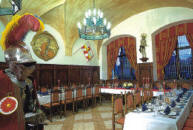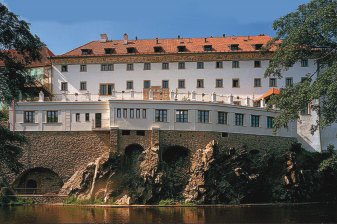|
Czech Republic |
|
Find a premier Hotel & Resort at
Hilton Hotels.
or book
Sheraton Hotels and Resorts
|
|
|
 Extended SuperSaver®
Hotel listings
Brno
Karlovy Vary
Prague
Extended SuperSaver®
Hotel listings
Brno
Karlovy Vary
Prague |
|
|
Czech Republic
Additional Listings |
|
|
SuperSaver Hotels
Brno
Karlovy Vary
Kasperské Hory
Ostrava
Plzen
Prague
Prague 1
Prague 2
Prague 3
Prague 8
Praha
Praha 4
Praha 8
Trebon
Usti Nad Labem
 |
Built In The
Sixteenth Century As A Jesuit Monastery,
The Hotel Ruze Overlooks The River Moldau In The
Historic
Town Centre Of Cesky Krumlow,

HOTEL
RUZE
Horni 154 - Cesky Krumlov, Czech Republic
38101
|
|
|
|
The Czech Republic (Czech: Česká
republika) is a landlocked country in Central
Europe. The country has borders with Poland to
the north, Germany to the northwest and west,
Austria to the south, and Slovakia to the east.
Historic Prague (Czech: Praha), a major tourist
attraction, is its capital and largest city.
Other major cities include Brno, Ostrava, Zlín,
Plzeň, Pardubice, Hradec Králové, České
Budějovice, Liberec, Olomouc, and Ústí nad
Labem.
The country is composed of two entire historic
regions, Bohemia and Moravia, parts of Silesia
and small sections of historic Lower Austria.
The Czech Ministry of Foreign Affairs in 1993
announced that the name Czechia is to be used in
all situations other than formal official
documents and the full names of government
institutions [1], [2], but this has not caught
on in English usage. Its Czech equivalent Česko
faced opposition of the Czech people as well,
but now it seems to be quite settled down in the
language. See Names of the Czech Republic and
Czech lands.
History
Main article: History of the Czech lands
Archaeologists have found evidence of
prehistoric human settlement in the area dating
back to the Neolithic era. In the classical era,
from the 3rd century BC Celtic migrations, the
Boii (see Bohemia) and later in the 1st century
Germanic tribes of Marcomanni and Quadi settled
there. During the Migration Period of ca. the
5th century, many Germanic tribes moved westward
and southward out of Central Europe. In an
equally significant migration, Slavic people
from the Black Sea and Carpathian regions
settled in the area (a movement that was also
stimulated by the onslaught of peoples from
Siberia and Eastern Europe: Huns, Avars, Bulgars
and Magyars). Following in the Germans' wake,
they moved southward into Bohemia, Moravia, and
some of present day Austria.
During the 7th century the Frankish merchant
Samo, supporting the Slavs fighting their Avar
rulers, became the ruler of the first known Slav
state in Central Europe. The Moravian
principality arose in the 8th century (see under
Great Moravia).
The Bohemian or Czech state emerged in the late
9th century when it was unified by the
Přemyslids. The kingdom of Bohemia was a
significant local power during the Middle Ages.
It was part of the Holy Roman Empire during the
entire existence of this confederation.
Religious conflicts such as the 15th century
Hussite Wars and the 17th century Thirty Years
War had a devastating effect on the local
population. Bohemia later came under Habsburg
influence and became part of Austria-Hungary.
Following the collapse of this empire after
World War I, the independent republic of
Czechoslovakia was created in 1918. This new
country contained large German, Hungarian and
Polish minorities. Although Czechoslovakia was a
democratic and liberal state guaranteeing and
also implementing cultural and language rights
to its minorities (schools in German language
areas were entirely German), the centralistic
state did not grant its minorities territorial
political autonomy, which resulted in discontent
and strong support among the minorities to break
away from Czechoslovakia. Hitler used the
opportunity and, supported by Konrad Henlein's
Sudeten German Party, gained the majority German
speaking Sudetenland through the Munich
Agreement. Poland occupied majority Polish
speaking areas around Cesky Tesin, while
Slovakia gained greater autonomy, with the state
being renamed to "Czecho-Slovakia". Eventually
Slovakia broke away further in 1939 and the
remaining Czech territory was occupied by Hitler
who installed the so-called Protectorate of
Bohemia and Moravia, which was proclaimed part
of the Reich and where the Protectorate
President and Prime Minister were subordinate to
the Nazi Reichsprotektor ('imperial protector').
Appr. 125 000 citizens, including 83 000 Jews,
were killed, and hundreds of thousand of others
were sent to prisons and concentration camps or
forced labour. Czechoslovak government-in-exile
and its army fighting against Nazis were
acknowledged by Allies.
From 1945 to 1948 the Sudetenland was cleansed
of ethnic Germans (under the so-called Bene
decrees and the Treaty of Potsdam). About 3
million Germans, almost the entire German
minority of pre-War Czechoslovakia, were
expelled to Germany and Austria. As a
consequence, 15 000 - 30 000 (according to the
official German-Czech Committee of Historians)
Germans were killed or otherwise died. Only a
few who had been active in the resistance or
were required for economic reasons were allowed
to stay, though many of them emigrated later due
to the anti-German sentiment prevalent in post
War Czechoslovakia.
In 1948, a reconstituted Czechoslovakia fell
within the Soviet sphere of influence. In 1968,
an invasion by Warsaw Pact troops ended the
efforts of the country's leaders to liberalize
party rule and create "socialism with a human
face" during the Prague Spring. In 1989,
Czechoslovakia regained its political
independence through a peaceful "Velvet
Revolution". On January 1, 1993, the country
peacefully split in two, creating the
independent Czech and Slovak republics.
The Czech Republic joined NATO in 1999 and the
European Union on May 1, 2004.
|
|
|
Background:
|
Following the First World War, the closely related
Czechs and Slovaks of the former Austro-Hungarian
Empire merged to form Czechoslovakia. During the
interwar years, the new country's leaders were
frequently preoccupied with meeting the demands of
other ethnic minorities within the republic, most
notably the Sudeten Germans and the Ruthenians
(Ukrainians). After World War II, Czechoslovakia
fell within the Soviet sphere of influence. In 1968,
an invasion by Warsaw Pact troops ended the efforts
of the country's leaders to liberalize Communist
party rule and create "socialism with a human face."
Anti-Soviet demonstrations the following year
ushered in a period of harsh repression. With the
collapse of Soviet authority in 1989, Czechoslovakia
regained its freedom through a peaceful "Velvet
Revolution." On 1 January 1993, the country
underwent a "velvet divorce" into its two national
components, the Czech Republic and Slovakia. Now a
member of NATO, the Czech Republic has moved toward
integration in world markets, a development that
poses both opportunities and risks. In December
2002, the Czech Republic was invited to join the
European Union (EU). It is expected that the Czech
Republic will accede to the EU in 2004. |
|
Location:
|
Central Europe, southeast of Germany |
|
Geographic coordinates:
|
49 45
N, 15 30 E
|
|
Map references:
|
Europe |
|
Area:
|
total: 78,866 sq km
water: 1,590 sq km
land: 77,276 sq km |
|
Area - comparative:
|
slightly smaller than South Carolina |
|
Land boundaries:
|
total: 1,881 km
border countries: Austria 362 km, Germany 646
km, Poland 658 km, Slovakia 215 km |
|
Coastline:
|
0 km
(landlocked)
|
|
Maritime claims:
|
none
(landlocked)
|
|
Climate:
|
temperate; cool summers; cold, cloudy, humid winters
|
|
Terrain:
|
Bohemia in the west consists of rolling plains,
hills, and plateaus surrounded by low mountains;
Moravia in the east consists of very hilly country
|
|
Elevation extremes:
|
lowest point: Elbe River 115 m
highest point: Snezka 1,602 m |
|
Nationality:
|
noun: Czech(s)
adjective: Czech |
|
Ethnic groups:
|
Czech
81.2%, Moravian 13.2%, Slovak 3.1%, Polish 0.6%,
German 0.5%, Silesian 0.4%, Roma 0.3%, Hungarian
0.2%, other 0.5% (1991) |
|
Religions:
|
atheist 39.8%, Roman Catholic 39.2%, Protestant
4.6%, Orthodox 3%, other 13.4% |
|
Languages:
|
Czech
|
|
Currency:
|
Czech koruna (CZK)
|
|
Currency code:
|
CZK
|
|
Exchange rates:
|
koruny per US dollar - 36.325 (January 2002), 38.035
(2001), 38.598 (2000), 34.569 (1999), 32.281 (1998),
31.698 (1997) |
|
|
|
|
|

